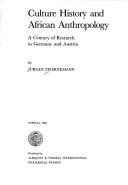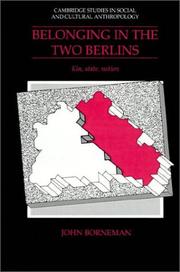| Listing 1 - 4 of 4 |
Sort by
|
Book
ISBN: 9783110214604 3110214601 9783110214611 311021461X 9786612715945 1282715941 Year: 2010 Volume: 68 Publisher: Berlin: de Gruyter,
Abstract | Keywords | Export | Availability | Bookmark
 Loading...
Loading...Choose an application
- Reference Manager
- EndNote
- RefWorks (Direct export to RefWorks)
Im Zentrum der Arbeit steht die historische Interpretation der reich mit Grabbeigaben ausgestatteten Friedhöfe des frühmittelalterlichen Merowingerreichs. Diese werden vor allem von der mitteleuropäischen Forschung traditionell als archäologische Hinterlassenschaften germanischer Stammesverbände angesehen, die sich im Zuge der Völkerwanderung in den ehemaligen Grenzregionen des Römischen Reichs an Rhein und Donau niedergelassen hätten. Die Arbeit zeigt die Wurzeln dieser Sichtweise im 19. Jahrhundert auf. Politische Bedeutung besaß die Erforschung der frühmittelalterlichen Friedhöfe besonders in der Zeit nach dem Ersten Weltkrieg. Während des Zweiten Weltkriegs sollte sie schließlich zur Rechtfertigung der nationalsozialistischen Expansionspolitik dienen.Die detaillierte Analyse der wissenschaftsgeschichtlichen Zusammenhänge verdeutlicht nicht nur den Einfluss des politischen Kontextes auf die archäologischen Interpretationen, sondern eröffnet auch alternative Deutungsmöglichkeiten: Im letzten Teil der Arbeit wird ein Modell präsentiert, dass das Aufkommen der Reihengräberfelder als kulturelle Reaktion auf den Zusammenbruch der Gesellschaftsstruktur in den ehemaligen Grenzregionen des Römischen Reichs interpretiert.
Merovingians. --- Ethnology --- Mérovingiens --- Anthropologie sociale et culturelle --- Ethnology -- France. --- Ethnology -- Germany. --- France -- History -- To 987. --- Germany -- History -- To 843. --- Merovingian dynasty. --- Mérovingiens --- Archaeology. --- Germanic tribes. --- Linear burial ground. --- Merovingian kingdom. --- National Socialism /Historical interpretation.
Book
ISBN: 9782810005291 281000529X Year: 2013 Publisher: Paris: Toucan,
Abstract | Keywords | Export | Availability | Bookmark
 Loading...
Loading...Choose an application
- Reference Manager
- EndNote
- RefWorks (Direct export to RefWorks)
Population aging --- Immigrants --- Vieillissement de la population --- Cultural assimilation --- Intégration --- Germany --- Allemagne --- Social conditions --- Conditions sociales --- Ethnology --- Turks --- National characteristics, Turkish. --- Emigration and immigration. --- Ethnology - Germany. --- Turks - National characteristics, Turkish. --- Germany - Emigration and immigration.

ISBN: 9155414931 9789155414931 Year: 1983 Volume: 6 Publisher: Stockholm: Almqvist och Wiksell,
Abstract | Keywords | Export | Availability | Bookmark
 Loading...
Loading...Choose an application
- Reference Manager
- EndNote
- RefWorks (Direct export to RefWorks)
Ethnology --- Culture --- History --- #SBIB:39A71 --- #SBIB:39A3 --- #SBIB:39A2 --- -Ethnology --- -Culture --- Cultural sociology --- Sociology of culture --- Civilization --- Cultural anthropology --- Ethnography --- Races of man --- Social anthropology --- Anthropology --- Human beings --- Etnografie: comparatieve studies --- Antropologie: geschiedenis, theorie, wetenschap (incl. grondleggers van de antropologie als wetenschap) --- Antropologie: methoden en technieken --- Social aspects --- Culture. --- History. --- Popular culture --- Ethnology - Germany - History --- Ethnology - Austria - History --- Ethnology - Africa - History

ISBN: 0521427150 0521415896 0511607717 Year: 1992 Publisher: Cambridge New York Cambridge University Press
Abstract | Keywords | Export | Availability | Bookmark
 Loading...
Loading...Choose an application
- Reference Manager
- EndNote
- RefWorks (Direct export to RefWorks)
Belonging in the two Berlins is an ethnographic investigation into the meaning of German selfhood during the Cold War. Taking the practices of everyday life in the divided Berlin as his point of departure, Borneman shows how ideas of kin, state, and nation were constructed through processes of mirror-imaging and misrecognition. Using linguistics and narrative analysis, he compares the autobiographies of two generations of Berlins residents with the official version of the lifecourse prescribed by the two German states. He examines the relation of the dual political structure to everyday life, the way in which the two states legally regulated the lifecourse in order to define the particular categories of self which signify Germanness, and how citizens experientially appropriated the frameworks provided by these states. Living in the two Berlins constantly compelled residents to define themselves in opposition to their other half. Borneman argues that this resulted in a de facto divided Germany with two distinct nations and peoples. The formation of German subjectivity since World War II is unique in that the distinctive features for belonging - for being at home - to one side exclude the other. Indeed, these divisions inscribed by the Cold War account for many of the problems in forging a new cultural unity.
Ethnology --- Berlin (Germany) --- Kinship --- Social conditions --- Economic conditions --- Social life and customs --- Ethnology - Germany - Berlin. --- Kinship - Germany - Berlin. --- National characteristics, West German. --- National characteristics, East German. --- Berlin (Germany) - Social conditions. --- Berlin (Germany) - Economic conditions. --- Berlin (Germany) - Social life and customs. --- Social Sciences --- Anthropology --- Social conditions. --- Economic conditions. --- Social life and customs. --- East German national characteristics --- West German national characteristics --- Clans --- Consanguinity --- Families --- Kin recognition --- Cultural anthropology --- Ethnography --- Races of man --- Social anthropology --- Human beings
| Listing 1 - 4 of 4 |
Sort by
|

 Search
Search Feedback
Feedback About UniCat
About UniCat  Help
Help News
News